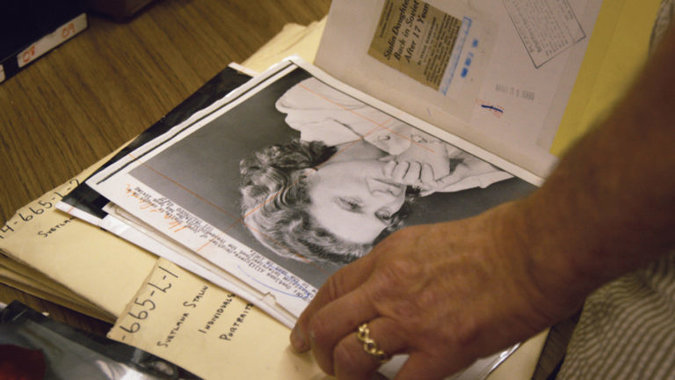
OBIT
Kino Lorber
Director: Vanessa Gould
Written by: Vanessa Gould
Cast: Bruce Weber, William McDonald, Margalit Fox, William Grimes, Douglas Martin, Paul Vitello, Jeff Roth, Jack Kadden, Peter Keepnews, Dolores Morrison, Jack Pareles, Daniel Slotnik, Earl Wilson
Opens: April 26 at New York’s Film Forum
“Would you like to live to 100?” is a question oft queried by youths. “Don’t ask me,” a respondent may reply. “Ask the man who’s 99.” Ask George Burns, who lived to 100 despite having smoked 300,000 cigars. Asked about his typical day, he answered: “The first thing I do each morning is to read the obituaries in the newspaper. If I don’t see my name, I go make breakfast.”
Who besides the late Mr. Burns habitually reads obits? I would suggest that people who are advanced in years and who have seen many of their friends die. Others may read about celebrities they know and love or people they hate and for whom an obit represents vengeance. Questions like these do not come up in this absorbing documentary filled with (too many) talking heads, but whatever you want to know about the obituary lottery, Vanessa Gould’s pic may have answers.
The most important statement that comes out of “Obit” is that writing death notices is not necessarily morbid. Why so? Because ninety percent of the information found in a reasonably extensive notice is not about the person’s death, though usually the cause of death appears in the second paragraph. It’s about a person’s happier days, and is therefore life affirming.
For example, you may never have heard of John Fairfax, yet he gets an extensive amount of print though he’s not an actor, an important politician, or the man who discovered a cure for smallpox. The impact he made on the world—and impact is the key term used by the New York Times to determine space in the paper—is that he was the first person to cross the ocean in a rowboat. Fairfax was no office drone but rather a guy who might even evoke envy from the obituary writers of the New York Times like William McDonald, Bruce Weber, Paul Vitello, Maragit Fox and Jeff Roth, because he lived fully, even exploring the Amazon jungle at the age of thirteen. And that’s a good thing because when at the moment of death on February 8, 2012, he must have recalled that he truly lived.
There are several ways you can avoid having death as your last hurrah. Your family might pay the Times to allow a few sentences on the page that covers paid notices. Or you could be of middling importance, if for example you founded the New York Film Critics Online. But others already have files among the thousands in cabinets, just waiting breathlessly to air out and see a chaotic mess of clippings reborn in neat paragraphs in the newspaper, like Ronald Reagan, Farah Fawcett, Jane Fonda, Mort Sahl, and even—surprisingly—the man who played bass in Bill Haley’s “Rock Around the Clock,” the most energetic song to come out of rock ‘n’ roll.
The Times people must stay on their toes, since the Internet, especially Wikipedia, can update obits within minutes after someone famous dies, undercutting later revelations in plain old print media. What’s more, on the ‘net, if you make a mistake, you can simply go to the article and delete the incorrect phrasing and substitute the proper words. The Times, however, must suffer the humiliation of printing the correction, hopefully in the next edition when angry readers call and chew out the Gray Lady.
Based on the person’s fame, the Times editorial staff will decide how many words he or she is worth, whether the person is relegated to an inside page of Section one, or if you’re really famous, get the person splashed on page one. Another factor would be whether to lead the obituary with the name of the person or whether the person is so known that you can suspend printing his name until an anecdote, like “The most surprising upset in presidential history occurred in November of 2016,” introduces the article.
“Obit” is certainly informative, a movie that can motivate you to do something cutting-edge enough at least for others to find your name in print without your family’s having to pay for placement. More archival film might be desired to get away from too much chatter by the Times staff–such as that which shows Fairfax getting cheers when he has navigated the ocean in a boat, or collages such as the rapid fire exhibit toward the conclusion of the film wherein a famous person appears every split second.
Unrated. 95 minutes. © Harvey Karten, Member, New York Film Critics Online
Comments, readers? Agree? Disagree? Why?
Story – B+
Acting – B
Technical – B+
Overall – B+





